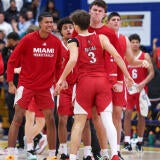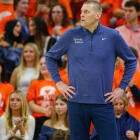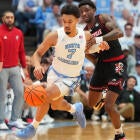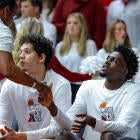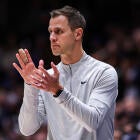How Longwood coach Griff Aldrich went from a corporate executive to leading the Lancers to the NCAA Tournament
Once a partner in a law firm and CFO of a private equity firm, Aldrich left it all behind to pursue a coaching career
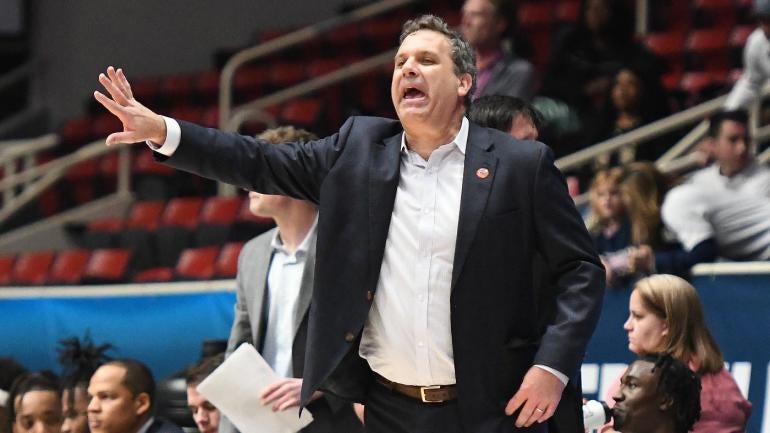
When Griff Aldrich left Farmville, Virginia, in 2000 after one season as an assistant coach at Division III Hampden-Sydney to become a lawyer, he was worried about "doing something with my life," he told CBS Sports last week.
"At the time, I thought 'I could be doing this for 30 years and never move up'," Aldrich said. "I had $40,000 in law school debt and I had an opportunity to go and work for a prestigious law firm in Houston -- or run the risk of slipping into the ether of nothingness. That was my perspective at that time."
As it turned out, being a college basketball coach in Farmville was Aldrich's calling all along. It just took a prolonged detour through the heights of corporate America for him to realize it.
The underdog stories created by the NCAA Tournament stage will capture the nation this week, and Aldrich's Longwood team is a perfect example. The No. 14 seed Lancers take on No. 3 seed Tennessee at 2:45 p.m. ET on Thursday at Bankers Life Fieldhouse in Indianapolis in the program's first-ever NCAA Tournament game.
Brackets are here! Get back in your pools and join our Men's and Women's Challenges for the chance to win a new truck and a college basketball dream trip!
Aldrich could feel a different buzz on campus last week just from his team's Big South Tournament title before the Lancers even knew when or where they would be playing this week.
"It's been a whirlwind," he said. "I think with the media and just the first time we've made the dance. So many people have never heard of Longwood or Farmville, Virginia."
The game televised by CBS Sports, could set ratings records in the town of roughly 7,500 that is 65 miles west of Richmond. Farmville is home to Longwood, a public university with an enrollment of less than 4,000. It is also the closest town to Hampden-Sydney, the private university of less than 1,000 students where Aldrich once played and where he briefly coached after graduating from law school at Virginia.
While Aldrich is the coach at this made-for-March school from the Big South that has reached the Big Dance, his own path is no rags to riches tale.
To the contrary, Aldrich is just six years removed from a riches to rags transition that prompted some of his own relatives to declare him crazy.
"Faith is central to me and my wife and our family, and we really felt like we were being directed on this path," Aldrich said.
Aldrich the businessman
When Aldrich left his assistant coaching job at Hampden-Sydney in 2000, he joined Vinson & Elkins, an international law firm headquartered in Houston that maintains offices around the world. He worked in places like London, rose to the level of partner and then eventually became CFO of a private equity firm.
In that role, Aldrich was responsible for "overseeing investments in the upstream energy sector," according to his Linkedin page.
Yes, Aldrich has a presence on LinkedIn, which is a striking reminder of just how unorthodox his path has been to the NCAA Tournament. You don't see Tom Izzo and Bill Self on Linkedin.
Even while Aldrich climbed the rungs of corporate America's ladder, though, his heart stayed on the hardwood. Aldrich spent nights and weekends on the AAU circuit, coaching future college and professional players, including 2017 NBA All-Star DeAndre Jordan.
He also developed a purpose beyond the Xs and Os. He founded the HIS Hoops program, seeking to provide spiritual and academic support to players, in addition to on-court coaching.
Aldrich and his family eventually became so immersed in the community that they moved into Houston's under-resourced Third Ward and began welcoming players into their homes – even as long-term residents in some cases. All the while, Aldrich continued grinding at the office but fitting in time for HIS Hoops.
"It was a passion, but it was much more than that," Aldrich said of his work in basketball. "It was a calling."
Eventually, the calling demanded more.
"I was really thinking about just doing more AAU coaching," he said.
Then, there was a discussion with his wife, Julie, in 2016 that went something like this, as Aldrich recalled.
Julie: "Don't you love college basketball?"
Griff: "Yeah, but I'm 42 and have been in the private sector for 16 years. You're not just putting out a resume on LinkedIn to get hired."
Discussions with friends like former college teammate Ryan Odom, then the coach at Division II Lenoir-Rhyne, only affirmed that Aldrich should pursue coaching as a vocation.
"They all were like, 'go for it' but of course there were no real opportunities," Aldrich said
Initially, Aldrich devised a plan that would allow him to leave the office at 3 p.m. to devote more time to his life in basketball and the community, with the caveat that he would take a pay cut at the firm and be expected to pull some late-night hours at home.
"But a month later, Ryan got the job at UMBC," Aldrich said. "That's when he offered me the position."
The position at UMBC
Aldrich's big break ultimately required him to do far more than just take a pay cut. He had to leave behind his CFO position at the private equity firm altogether in exchange for a job that in 2017 paid $40,000, according to UMBC's salary database.
The position as director of recruiting for UMBC – an entry-level job in the Division I basketball coaching world – would be held by the ex-law partner and former CFO in his 40s with a degree from one of the nation's top law schools.
For Aldrich, it was a leap of faith.
"I think people understood that it was a different passion...," he said. "But no doubt, there were quite a few people who thought we were crazy, including people in our family."
People likely also thought Aldrich was crazy when he pushed hard to sign a 5-foot-8 junior college point guard originally from Puerto Rico named K.J. Maura. Then, on March 16, 2018, Maura became one of the faces of arguably the greatest upset in college basketball history.

With Aldrich on the bench in his second season at UMBC under Odom, the Retrievers became the first No. 16 seed in NCAA Tournament history to defeat a No. 1 seed as they took down Virginia 74-54.
"It was surreal," Aldrich said. "I think it was one of the first or second media timeouts. (UMBC assistant) Nate Dixon and I were looking at each other and saying, 'we can play with these guys.'"
This is where the story gets a bit uncomfortable for Tennessee fans, who were among Loyola-Chicago's victims in that same 2018 NCAA Tournament, when Sister Jean and the Ramblers challenged UMBC for the top story from a legendary March Madness.
Can Aldrich's experience from that historic upset help the Lancers as they take on the Volunteers?
"To some extent, the familiarity of being an extreme underdog will help," Aldrich said. "But I think probably just the rhythm of being in the tournament will be more helpful."
Landing with the Lancers
Shortly after UMBC's upset win over the Cavaliers, Aldrich accepted the head coaching job at Longwood, a still young D-I program that had posted a combined 13-50 record over the previous two seasons. Four years in, that program is in the same South Region of the NCAA Tournament bracket as Arizona, Villanova, Tennessee, Illinois, Houston, Ohio State, Michigan and many other legacy programs.
"I felt like, especially given his non-traditional experience, he could provide a great example for our young men and a great leader for our basketball person," then-Longwood athletic director Troy Austin said.
Aldrich's last stint as a head coach prior to Longwood was in the AAU ranks. You wouldn't know it from watching the Lancers, who rank 18th nationally with a 38% 3-point shooting percentage entering the NCAA Tournament. But even in Aldrich's fourth season as the Lancers' head coach and with his days as a business executive fading into the past, the traces of his past life are still evident.
Longwood's leading scorer, sophomore guard Justin Hill, is from Houston. Overall, the program's roster is a mixture of players like Hill recruited out of high school and guys like second-leading scorer Isaiah Wilkins, who transferred in after stints at Virginia Tech and Wake Forest.
When Longwood takes transfers, Aldrich prefers that they have multiple seasons of eligibility remaining. Simply rebuilding a roster every season through the portal for the sole purpose of on-court success does not appeal to Aldrich, who has held firm to his view that his calling is to do more than just win games.
"A big element of our program is about helping our young men grow and develop as men," he told the National Association of Basketball Coaches in a recent interview. "We really, perhaps selfishly, believe that as our guys grow as men that they will improve as basketball players as well and they'll improve as students and hopefully really grow into being great husbands, fathers and co-workers."
Differentiating himself
The opportunity at UMBC under Odom wasn't actually Aldrich's first chance to be on a Division I staff. When Aldrich and Odom first became close friends while playing at Hampden-Sydney in the 1990s, Aldrich also got to know his teammate's family.
Aldrich had applied to law school as a backup plan. But his Plan A was to enter coaching, and he'd talked with Odom's father, former Wake Forest and South Carolina coach Dave Odom, about a volunteer or graduate assistant spot with the Demon Deacons after graduation.
When word got back to Dave Odom that Aldrich had been admitted to law school at Virginia, things changed. Odom had spent seven seasons on the Virginia staff in the 1980s and knew all about the prestige of UVA's law school.
Odom told Aldrich to forget about coming to Wake Forest. Instead, as Aldrich recalled, Odom instructed him to attend law school and "go differentiate himself."
For over a quarter-century now, Aldrich has been doing just that.
Just go check out his Linkedin for the proof.
"I had the benefit of having made partner and doing some other things professionally, and I realized that it was not fulfilling for me, not what defines and wasn't what I was called to do," Aldrich said. "But I didn't have that maturity or that spiritual awareness as a 25-year old to say, 'no this is what I'm called to do.' I also don't know that I had the awareness that it was a calling for me at that point. Maybe it wasn't.
"I probably was supposed to go on the journey I went on."







